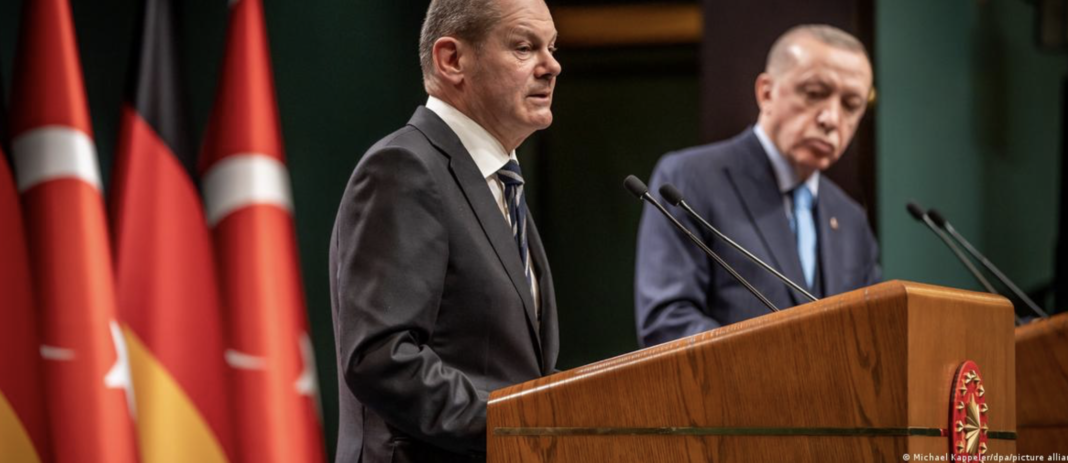Turkish President Recep Tayyip Erdogan is coming to Berlin for talks with Chancellor Olaf Scholz. With their positions on the war in the Middle East far apart, it’s unlikely to be a friendly visit.
This article was originally written in German.
Turkish-German relations have reached a low point. War in the Middle East is the chief cause, given the countries’ divergent views on the ongoing conflict between Israel and Hamas. Turkish President Recep Tayyip Erdogan has resorted to harsh rhetoric criticizing Israel and defending Hamas, which Turkey’s Western allies like Germany consider a terrorist organization.
For 75 years, Israel has been trying to « establish a state on land that was stolen from the Palestinian people, » Erdogan said recently in Ankara. Israel’s legitimacy is being called into question by its « own fascism, » he added.
At a news conference in Berlin on Tuesday, German Chancellor Olaf Scholz called Erdogan’s comments « absurd, » stressing that Israel is a democracy.
Josef Schuster, head of the Central Council of Jews in Germany, the official but by no means only representative of Germany’s Jews, also attacked Erdogan. He accused him of « fueling the protests on German streets and the psychological terror against Jews in Germany with his propaganda. »
Germany and Turkey: Dependent on each other
While some officials have suggested canceling the visit due the controversy, the German government wanted to push ahead. The opposition center-right Christian Democrats (CDU) agreed. Their leader, Friedrich Merz, said Turkey is too important for Germany. The two sides could not afford to stop talking with each other.
Germany is home to about 1.5 million people with Turkish citizenship. Two-thirds of them voted for Erdogan in elections earlier this year, in a vote that international observers called free but unfair.
Turkey, which is struggling economically, benefits from good business ties with Germany and the European Union. Conversely, Turkey is an important partner in efforts to stymie the flow of refugees heading toward the EU.
Seven years ago, Erdogan reached an agreement with the EU to stop smugglers and take back migrants whose asylum applications were rejected in neighboring Greece. In return, Ankara received billions of euros to accommodate the people in the country. The EU is hoping for a revival of this refugee pact.
Turkey can also serve as a crisis mediator, as it has been doing between Ukraine and Russia. The recent conflict between Israel and Hamas has raised Turkey’s profile even more in this regard.
« It’s important that the war there does not spread, and of course, Turkey also plays a role in this, » Marie-Agnes Strack-Zimmermann, who chairs Germany’s parliamentary defense committee, told DW. « In this respect, we have to talk to each other. The question is, how direct we can be. »
Erdogan’s visit light on official events
Erdogan will arrive in Berlin on Friday afternoon, according to the released agenda. He will be received first by German President Frank-Walter Steinmeier, and will then dine with Scholz at the chancellery.
Observers have said the German government hopes to limit Erdogan’s public exposure. On a three-day visit in 2018, he held rallies, lashed out at Kurdish activists and drew street protests that criticized Turkey’s human rights record on his watch. More famously, he held a rally in 2010 attended by 15,000 people in the western city of Cologne, which is home to a large Turkish community.
At the time, he told the crowd that Turkish immigrants should integrate and learn German, but that « nobody can expect you to assimilate. »
Initially, Erdogan was scheduled to attend the men’s international soccer match between Germany and Turkey at the Olympic Stadium in Berlin on Saturday. But this event has been canceled.
People in Berlin can expect enhanced security in the city during Erdogan’s visit, especially around the government area. The measures are likely to extend into Saturday, as thousands of Kurds intend to protest Erdogan’s policies and express support for the Kurdistan Workers’ Party, which has been banned in Germany for decades.

